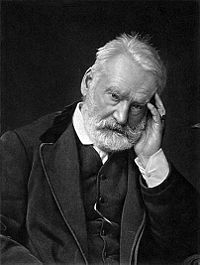 Victor-Marie Hugo (February 26, 1802 – May 22, 1885) was a French poet, playwright, novelist, essayist, visual artist, statesman, human rights campaigner, and perhaps the most influential exponent of the Romantic movement in France.
Victor-Marie Hugo (February 26, 1802 – May 22, 1885) was a French poet, playwright, novelist, essayist, visual artist, statesman, human rights campaigner, and perhaps the most influential exponent of the Romantic movement in France.
In France, Hugo's literary reputation rests primarily on his poetic and dramatic output and only secondarily on his novels. Among many volumes of poetry, Les Contemplations and La Légende des siècles stand particularly high in critical esteem, and Hugo is sometimes identified as the greatest French poet.
In the English-speaking world his best-known works are often the novels Les Misérables and Notre-Dame de Paris translated into English as The Hunchback of Notre-Dame.
Though extremely conservative in his youth, Hugo moved to the political left as the decades passed; he became a passionate supporter of republicanism, and his work touches upon most of the political and social issues and artistic trends of his time. He is buried in the Panthéon.
He was born in 1802 in Besançon and lived in France for the majority of his life. However, he was forced into exile during the reign of Napoleon III. he lived briefly in Brussels during 1851; in Jersey from 1852 to 1855; and in Guernsey from 1855 to 1870 and again in 1872-1873. There was a general amnesty in 1859; after that, his exile was by choice.
Hugo's early childhood was marked by great events. The century prior to his birth saw the overthrow of the Bourbon Dynasty in the French Revolution, the rise and fall of the First Republic, and the rise of the First French Empire and dictatorship under Napoleon Bonaparte.
Napoleon was proclaimed Emperor two years after Hugo's birth, and the Bourbon Monarchy was restored before his eighteenth birthday. The opposing political and religious views of Hugo's parents reflected the forces that would battle for supremacy in France throughout his life: Hugo's father was a high-ranking officer in Napoleon's army, an atheist republican who considered Napoleon a hero; his mother was a staunch Catholic Royalist.
 ශිල්ප 64
ශිල්ප 64